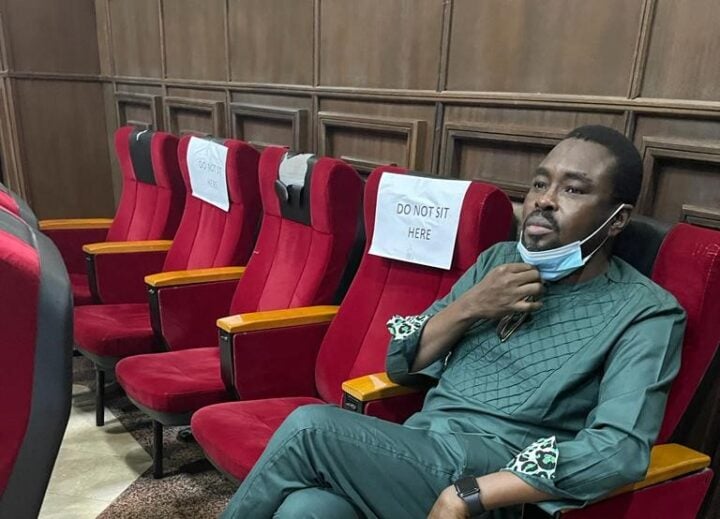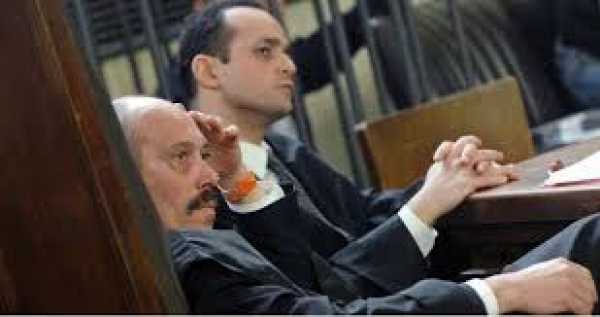Milan prosecutors Fabio De Pasquale and Sergio Spadaro have been sentenced to eight months in prison for hiding vital evidence in the trial of Shell and Eni over the OPL 245 affair.
According to a report by Ansa, an Italian news website, the sentence was handed down by a Brescia court on Tuesday.
The sentence, which is suspended — meaning they would only go to jail if there is a repeat offence — is another episode in the OPL 245 saga which the Italian prosecutors lost in the Court of Milan after failing to provide evidence of fraud in the sale of the oil block to Shell and Eni by Malabu Oil and Gas Limited, a Nigerian company, in 2011.
All the cases alleging fraud in the OPL 245 transaction failed in Italy, the UK and in Nigeria.
The Brescia court, chaired by Roberto Spanò, ruled that De Pascale and Spadaro as state attorneys had a legal obligation to present all documents during the trial in Italy.
These documents include those that could have helped the case of the defence.
The judges ruled that the prosecutors gad infringed the rights of the defendants by failing to provide them.
Their lawyers had asked the magistrates to acquit them on the ground that they were not under obligation to present the documents to the Milan court.
De Pasquale was demoted in May 2024 by the country’s Superior Council of the Judiciary (CSM) for “lack of impartiality and fairness” in the way he handled the prosecution.
He had also hidden evidence that showed that the property purportedly linked to Mohammed Bello Adoke, the Nigerian attorney-general when the OPL 245 resolution agreement was signed, as bribe from the OPL 245 in fact belonged to the Central Bank of Nigeria (CBN).
Adoke was discharged by an FCT high court in March 2024 over allegations of bribery and corruption in the transaction filed by the Economic and Financial Crimes Commission (EFCC).
Also discharged and acquitted by the court are: Aliyu Abubakar, a businessman; Rasky Gbinigie, Malabu Oil & Gas Ltd’s company secretary; Malabu Oil & Gas Ltd; Nigeria Agip Exploration (NAE); Shell Ultra Deep Nigeria (SNUD) Ltd; and Shell Nigeria Exploration Production Company (SNEPCO) Ltd.
The high court chided the EFCC for wasting four years over the case without a shred of evidence of crime.
THE OPL 245 CASE
Shell and Eni had, in 2011, paid $1.1 billion to acquire OPL 245 after Malabu, the original allotee, relinquished its entire interest in the oil block.
This followed a settlement brokered by the Nigerian government to end a 10-year legal dispute on the acreage, which is considered to be one of the richest in Africa.
The oil companies also paid a signature bonus of $210 million to the Nigerian government. It is the biggest signature bonus in Nigeria’s history.
However, transparency watchdogs alleged that the $1.1 billion paid to Malabu was intended to bribe government officials.
In 2018, De Pasquale launched a criminal case against the oil companies, their executives, agents and some Nigerians, including Dan Etete, former minister of petroleum resources.
The government of Nigeria joined the suit as the civil “injured” party, while Royal Dutch Shell, ENI S.P.A., Shell Petroleum Development Company of Nigeria Ltd, Shell UK Ltd, and Shell Exploration and Production Africa Ltd were listed as “parties liable for civil damages”.
After a trial that lasted for nearly three years, the Court of Milan, presided over by Marco Tremolada, determined that the allegations of fraud and corruption were not proven.
In July 2022, an attempt to appeal against the verdict was terminated by the attorney general of Italy who said the case “must finish today because it has no basis… in fact, it should have finished earlier”.
Two defendants — including a Nigerian middleman — who had been convicted and jailed in a fast-tracked aspect of the trial were freed after winning on appeal.
WHAT DID DE PASQUALE AND SPADARO ‘HIDE’?
It came to light in June 2021 — three months after Shell and others were discharged and acquitted — that some vital pieces of evidence in the possession of the prosecutors were hidden from the Court of Milan.
This was considered to be a professional misconduct and is now being treated as a criminal act.
The judges of the Milan court said it was “incomprehensible” that the public prosecutor chose “not to file among the proceedings a document which contains extraordinary elements in favour of the defendants”.
One, there was a secretly recorded video in which the former Eni manager, Vincenzo Armanna, who was a defendant in the trial and whose witness statements formed a large part of the prosecution’s case, spoke with Piero Amara, a former lawyer of Eni.
According to the judges, Armanna disclosed an intention to blackmail Eni’s top management and launch a devastating media campaign against them. He hoped to turn to the prosecutor to get them covered in “an avalanche of s***”.
Two, Paolo Storari, the Milanese prosecutor, had sent to De Pasquale and Spadaro chats found on Armanna’s phone suggesting that he had paid $50,000 to Isaak Eke, a Nigerian witness, to make accusatory statements against some co-defendants.
Three, Armanna had also produced purported WhatsApp conversations with Claudio Descalzi, Eni CEO, and Claudio Granata, chief of staff, in 2013 seeking to prove that they asked him to recant his allegations of corruption in the OPL 245 case so that he could be re-hired by the oil company and be helped to make money through a Nigerian firm.
However, it turned out the chats were fabricated after a technological analysis was done in 2021.
The Vodafone numbers attributed to the two top Eni executives were not active in 2013 and did not have any call records.
In January 2023, Christian Colombo, the judge in the preliminary hearing at the Court of Brescia, indicted De Pasquale and Spadaro and remanded them for failing to file the evidence.
Colombo accepted the evidence provided by Brescia prosecutors — Francesco Milanesi and Donato Greco — and decided that the indicted prosecutors should go on trial.
He said De Pasquale and Spadaro had a duty not to conceal from the defence and from the court the facts and evidence at their disposal.
WHAT DOES DE PASQUALE WANT?
De Pasquale styles himself as an anti-corruption hunter and was celebrated for getting Silvio Berlusconi, the former Italian prime minister, convicted over tax fraud in 2012.
He had also been looking to get Eni convicted over allegations of corporate fraud. The OPL 245 case provided him an opportunity to prosecute what transparency campaigners described as “the biggest corporate fraud in history”.
In November 2015, De Pasquale visited Nigeria and had meetings with senior government officials, including Vice-President Yemi Osinbajo, over the OPL 245 affair.
TheCable understands he suggested that Nigeria could get back the $1.1 billion paid by Shell and Eni to Malabu by criminalising the 2011 settlement agreement so that he could pursue a criminal case against the key entities and persons in Italy.
Adoke alleged in his book, ‘Burden of Service’, that the EFCC was asked to go after him by putting him on trial and getting a conviction to serve as proof of corruption in the deal.
This was expected to strengthen De Pasquale’s case in Milan.
Adoke was not in trial in Italy, but the EFCC filed several cases against him in Nigeria and his name was constantly mentioned in the Milan court, although the court did not make any adverse pronouncement against him in its verdict.
One of the cases filed against Adoke was that he collected a $2 million bribe from the $1.1 billion paid to Malabu and bought a property in Abuja, an allegation he denied and for which he has been cleared.

‘DE PASQUALE HIDING VITAL EVIDENCE’
In May 2018, when the Milan trial was on, Adoke alleged that the Italian prosecutors had hidden vital evidence from the court which would have exonerated him of alleged bribery in the transaction.
In June 2021, he also wrote a petition to the Italian minster of justice to complain about the prosecutors.
Adoke alleged that they deliberately concealed his failed N300 million mortgage transaction with Unity Bank from the Milan court just to create the impression that it was a bribe.
He also alleged that an email purportedly sent by him from the account of a property company mentioned in the OPL 245 payments was forged.
Adoke further alleged that a phone conversation was stage-managed to implicate him.
In it, somebody posing as Adoke was heard saying he knew the OPL 245 deal was “a presidential scam”.
Following a petition by Adoke, the Nigerian police quizzed and indicted Olanrewaju Suraju, chairman of HEDA, over allegations of forgery.
HEDA is the Nigerian partner of the international campaigners who helped the Italian prosecutors in the OPL 245 trial.
The Corner House, Re:Common and Global Witness worked with HEDA to generate global media publicity around the trial.
Suraju was charged to court by the federal government over the forgery allegations.
The government later decided to terminate the case, reportedly because it was relying on the same disputed evidence in its civil claims against JP Morgan over the OPL 245 deal.
Suraju was then discharged but not acquitted by the Nigerian court.
Nigeria still lost the JP Morgan case as the commercial court in London ruled that there was no evidence of fraud in the OPL 245 deal.
[TheCable]


